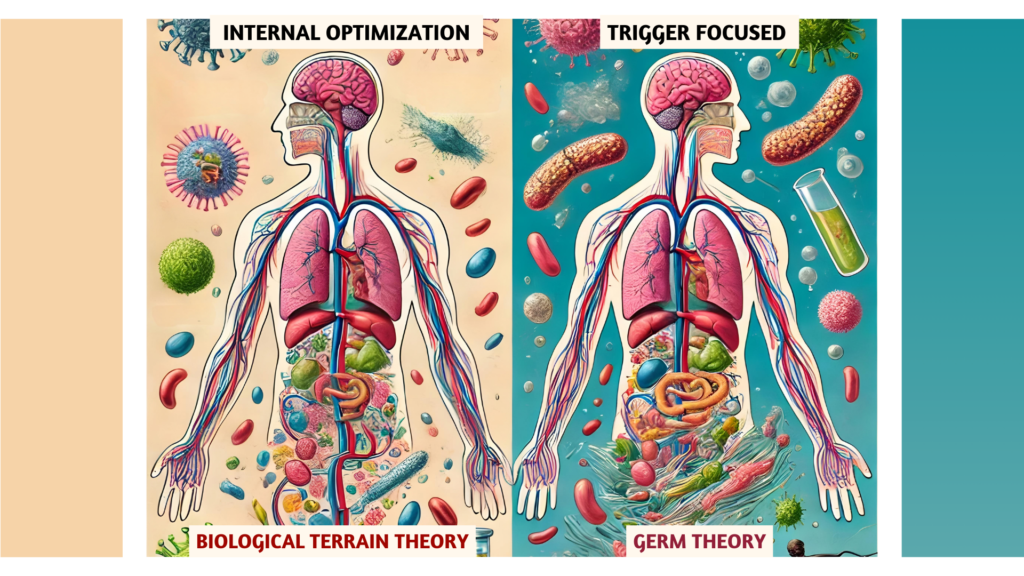A Deeper Look into Bernard’s Biological Terrain vs. Pasteur’s Germ Theory of Disease
As a preventive care physician, the debate between focusing on antecedents (underlying factors) and triggers (immediate causes) has long-standing roots in medical philosophy. One of the most illuminating historical debates in this context is the clash between Claude Bernard’s Biological Terrain Theory and Louis Pasteur’s Germ Theory of Disease. Understanding this debate not only clarifies why antecedents are crucial for health but also explains why modern medicine must evolve beyond just managing acute triggers.

Bernard’s Biological Terrain Theory vs. Pasteur’s Germ Theory
Claude Bernard, a French physiologist, emphasized the “biological terrain”—the internal environment of the body—as the key to health. He believed that if the body’s internal balance (or homeostasis) is well-maintained, the body can resist infections and diseases effectively. His philosophy revolves around the idea that microorganisms (germs) become pathogenic only in a body whose internal environment is compromised, favoring disease.
On the other hand, Louis Pasteur proposed the “germ theory of disease”, which became the foundation for modern medicine. Pasteur’s theory asserts that microorganisms—bacteria, viruses, and fungi—are the primary causes of disease. This led to the development of vaccines, antibiotics, and other treatments aimed at killing or neutralizing pathogens.
Though Pasteur’s theory revolutionized medicine, Bernard’s focus on biological terrain holds immense value, especially in the context of chronic diseases and preventive care.
Why Bernard’s Approach is Better for Understanding Antecedents
Application of Terrain Theory: Mitochondrial Dysfunction and Chronic Disease
In many modern chronic diseases, we see how Bernard’s biological terrain concept holds true. Take mitochondrial dysfunction, for example. Poor mitochondrial health leads to decreased cellular energy, increased oxidative stress, and chronic inflammation—all of which contribute to a deteriorating biological terrain that promotes the development of diseases like diabetes, cardiovascular disorders, and neurodegenerative conditions.
Addressing triggers (such as elevated blood sugar or high cholesterol) through medication is only a short-term solution because it doesn’t correct the antecedents like mitochondrial dysfunction, chronic inflammation, or oxidative stress. By focusing on improving mitochondrial function through diet, exercise, and metabolic therapies, we optimize the terrain, making the body more resilient to both infectious and chronic diseases.
Pasteur’s Germ Theory: A Trigger-Focused Model
While Pasteur’s germ theory is highly effective for acute infections, its dominance has led to a healthcare system that often prioritizes crisis management. Antibiotics, antivirals, and vaccines target triggers—the infectious agents—rather than the antecedents that predispose an individual to fall ill.
For example:
- Antibiotics can eliminate bacteria, but if the patient’s biological terrain remains compromised due to poor diet, stress, or environmental toxins, they may face recurrent infections or even chronic inflammatory conditions.
- Vaccines protect against specific viruses, but if the immune system is weak or dysfunctional (due to antecedents like poor gut health, nutritional deficiencies, or chronic inflammation), the individual may still struggle with immune-related diseases or other viral challenges.
Building Health: Focusing on the Terrain (Antecedents) for Resilience
Focusing on Bernard’s biological terrain offers a holistic approach to health that is especially relevant in today’s world of chronic disease. By addressing antecedents such as:
- Diet: Nutrient-dense foods rich in antioxidants, healthy fats, and clean proteins strengthen the terrain.
- Detoxification: Clearing environmental toxins reduces the burden on organs like the liver and kidneys, preventing a buildup of harmful substances that contribute to chronic illness.
- Stress management: High-stress levels lead to hormonal imbalances, mitochondrial dysfunction, and compromised immunity.
- Microbiome health: A balanced gut microbiome supports immune function and protects against both infections and inflammation.
When we optimize the terrain by focusing on these antecedents, we improve the body’s resilience. This resilience not only helps fend off infections but also prevents the onset and progression of chronic diseases.
